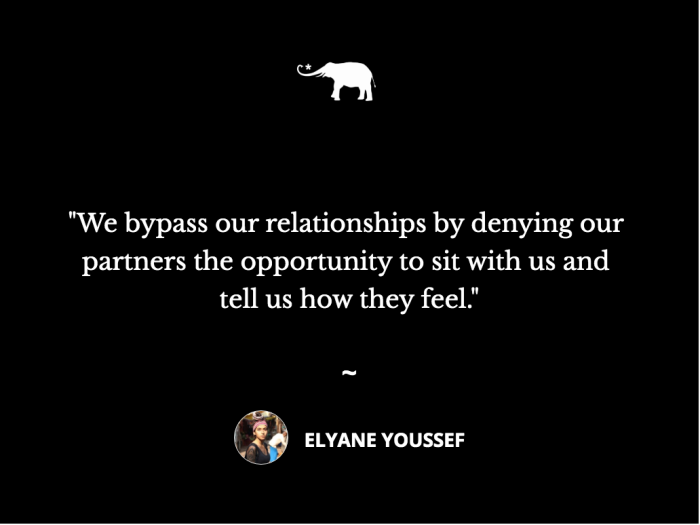View this post on Instagram
I still remember the first fight I had with my husband.
We had been together for four months, and I was at his place expressing what upset me. When the waterworks kicked in, he expressed his disappointment.
He told me that he wasn’t expecting this fight and all that he wanted was a happy relationship without any fights or disagreements.
“If you expect me to be constantly happy without experiencing any feelings of anger or sadness or disappointment, I don’t think we’re right for each other. If we want this to work, we have to love each other with all our feelings…the good and the sh*tty ones.” I said in all seriousness.
That day changed our relationship forever—for the better.
We’ve all been guilty of emotional bypassing in our relationships. Just as we think that a spiritual practice should be nothing but positive and happy and peaceful, whether we like to admit it or not, we think the same about relationships.
We want our dates, lovemaking, conversations, hangouts, and trips to go smoothly. We want what we see in the movies, but this isn’t possible. There are bound to be a few ups and downs, and some days will be a downright disaster.
Unhappy and abusive relationships are something else (and please find a way out or a long-term, healthy solution if you’re in one). But if your relationship has sporadic quarrels, it’s normal and it’s about time we learn how to deal with them.
That said, no, you’re not fine. You’re not okay, and yes, what happened troubled you.
In the past, I did (and faced) a lot of emotional bypassing with my ex-partners. In a nutshell, emotional bypassing mostly happens when or if we are not ready (or don’t know how) to face the challenges that our relationships encompass.
So we repress and avoid the inner work we should do in order to maintain “peace” in the relationship.
We don’t “talk about it” because we might be afraid to show our vulnerable side.
We avoid expressing our most heartfelt feelings in fear of being hurt again.
We mask it all up. We say it’s no biggie. I’m okay. I’m fine. No need to talk about it.
We are often in denial. We run away from any conversation that might take us back to a painful memory.
We mask our anger, disappointment, and sadness and think that tomorrow is a new day and our hostile feelings will diminish in no time.
We reduce the impact of lies and betrayal on purpose so we don’t come off as codependents, attached, or “not cool enough.”
Fights are uncomfortable and “wrong.” Happy couples don’t fight, right?
And let’s not forget about oversensitivity and paranoia. If our partner opens up, we call them too sensitive. Too needy. Too everything.
Let’s be honest. We all have unresolved emotional issues, and denying them is problematic. When we downplay our needs because we think they’re not too important, we only brush them under the rug. We don’t solve the problem; we only silence it.
When we don’t allow ourselves to fully process a hurtful situation, we bottle up our emotions until we can’t contain them anymore. Then one day, we will blow up and say all sorts of insensitive things to our partner.
This is emotional bypassing.
We bypass our relationships by denying our partners the opportunity to sit with us and tell us how they feel.
Please know that a good relationship starts only when we accept our feelings as valid. A relationship that hides and smothers is most likely doomed.
We need to hold space for how our partners feel and think. We have to make them feel safe enough to express their concerns and worries. When we relate to each other authentically, our relationships transform for the better—moments of intimacy increase, our bond strengthens, feeling secure expands.
Constant and everlasting happiness shouldn’t be our main goal in love. Our primary purpose—and focus—should be how to make room for growth. Without growth and personal expansion, our unions will have difficulty thriving.
Communicate more often, avoid labels and judgment, and please don’t think that a happy relationship doesn’t involve negative emotions. My partner and I have learned tremendously from all our disagreements, and you can too.
~


 Share on bsky
Share on bsky





Read 13 comments and reply